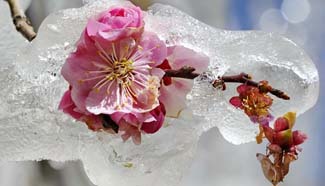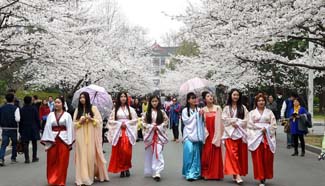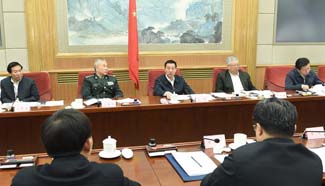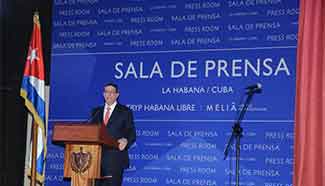????From Moscow to St. Petersburg, Russia was covered in the golden hues of autumn and the celebration of triumph and peace. History: Beacon of Future -- Commemoration of 70th Anniversary of Victory of Chinese People’s War of Resistance Against Japanese Aggression and World Anti-Fascist War, a week-long cultural exchange between the armed forces of China and Russia, opened in Moscow on Sept. 15.
????In the following days, the Chinese delegation held the opening ceremony of the culture exchange week in Moscow, military music performances in military bases in Moscow and St. Petersburg, and book and painting exhibitions in the Museum of the Great Patriotic War in Moscow. Films about China’s resistance against Japanese aggression were also shown in cinemas in the two cities.
????The painting exhibition in the Museum of the Great Patriotic War featured 84 works by 60 military artists, including traditional Chinese paintings, oil paintings, etchings and cartoons. The art works showed the heroism of the Chinese people and armed forces in fighting the Japanese and their contribution to the world war. The accompanying book exhibition featured more than 200 publications on China’s resistance and World War II, most of which had never been shown in Russia before. The delegation also gifted books to the Russian national library and Russia’s Military University of the Ministry of Defense.
????Alexander Rivic, 92, waited for hours in full regalia to see the painting exhibition before it opened in the afternoon of Sept. 16.
????The old man became emotional at the depiction of Russian and Chinese troops fighting the Japanese invaders in the oil painting “Recovery of Shanhaiguan.” Rivic recalled fighting side by side with comrades and soldiers of the Eighth Route Army under the Communist Party of China to take Shanhaiguan, a strategic mountain pass in north China, from the Japanese.
????As a veteran of the war, Rivic understands the trauma of war and the sacrifice behind the hard-won peace.
????The Soviet Union lost 27 million people and 35 million Chinese were killed or injured, Rivic said. They made great sacrifices for the world’s victory over fascism. Friendship between the two nations was forged with blood, which their soldiers shed together on the same battlefields for a common cause, he added, as he took a photo with the painting. “I will tell the story to my children and grandchildren, so they will remember history and the friendship between Russia and China.”
????Films on battles against Japanese aggression impressed Russian audiences in cinemas across Moscow and St. Petersburg. Some viewers watched several films in a row.
????Lena, 11, a student at a juvenile military school in Moscow, watched the films with her classmates. “I like China. The movies help me better understand China and its history,” she said.
????“Chinese is difficult, but interesting,” said Lena, who has been studying Chinese since the age of eight. She wanted to be a translator to help make China and Russia even better friends.
????The Military Band of the Chinese Liberation Army, which had just performed at the Spasskaya Tower International Military Music Festival, performed three times in Moscow and St. Petersburg with the military bands of Russia’s Ministry of Defense and western military district.
????Chinese symphonies such as “On the Songhua River,” “On Taihang Mountain,” “Song of the Guerrilla” and “Defend the Yellow River” depicted the atrocities of Japanese aggression and the determination of the Chinese forces led by the Communist Party to drive invaders out. Masterpieces like “The Saber Dance” and “The Blue Scarf” underlined the Russian people’s bravery and loyalty to their country. Military bands of the two countries jointly performed classic works of both countries such as “In That Place Wholly Faraway,” “Katyusha” and “Ode to the Yangtze River,” winning applause from the audience.
????“Military music is the best way to express the combative nature of the armed forces, the thoughts and emotions of soldiers. The joint performance of both countries’ military bands showed great skill and rapport,” the commander of the military band of Russia’s western military district said. His band looked forward to more cooperation and developing ties with Chinese counterparts.
????Russian mainstream media paid much attention to the Chinese military culture week, with frequent reports and discussions on Russian websites and forums.
????Russia’s Interfax news agency reported the Russian and Chinese military commemorated martyrs on the 70th anniversary of victory in the war, showcasing and cementing ties between the two countries’ armed forces. ITAR-TASS news agency reported that the Chinese military culture week helped Russians better understand China and its armed forces. It promoted understanding and trust, and brought two powerful forces closer.










